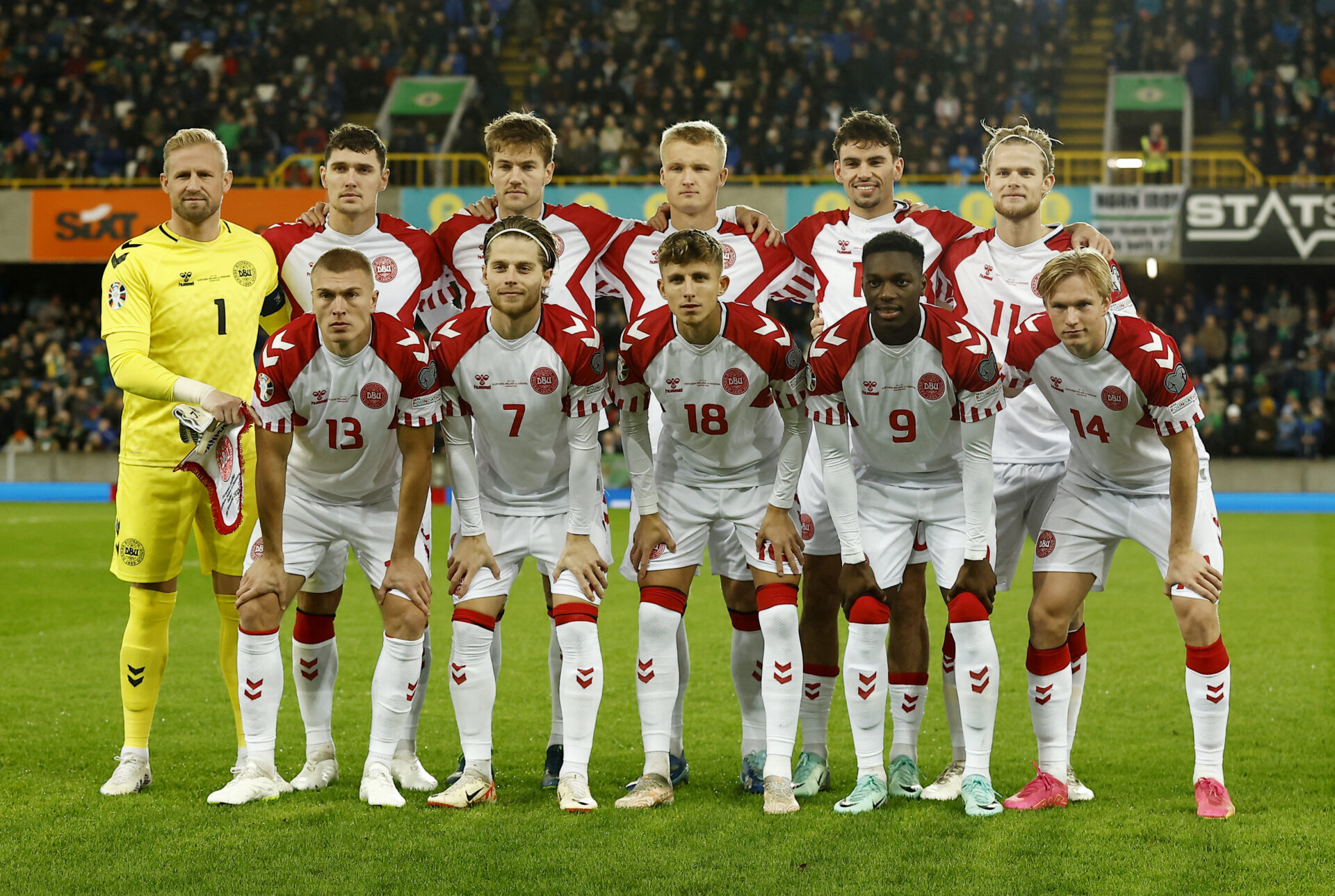

The UEFA Euro 2024 knockout stages ignite on June 30th with a tantalizing encounter that promises to be a symphony of steel and silk. In one corner stands Germany, the tournament’s resurgent host nation, a team reborn under the astute leadership of Hansi Flick. In the other, Denmark, the perennial dark horses, a side renowned for their resolute defending and potent counter-attacking prowess under the wily guidance of Kasper Hjulmand. This tactical chess match transcends a mere football contest; it’s a clash of philosophies, a crucible where youthful exuberance meets seasoned experience, and where attacking verve collides with defensive solidity.
Die Mannschaft, under Flick’s meticulous tutelage, has undergone a metamorphosis. The sting of recent international disappointments has morphed into a steely determination, a collective will to reclaim their place atop the European pecking order. Their group stage campaign showcased a potent blend of youthful exuberance and experienced leadership, a tactical orchestra conducted by the precocious maestro, Florian Wirtz.
This 21-year-old wunderkind has emerged as the creative fulcrum of the German attack. His balletic dribbling mesmerizes defenders, while his passes weave through congested midfields with the precision of a seasoned veteran. The partnership he has forged with Marco Reus, a seasoned campaigner with countless international battles under his belt, is a testament to Flick’s ability to blend experience with youthful exuberance. Reus, a predator with an unerring eye for goal, as evidenced by his clinical brace against Hungary, provides a potent finishing touch to Germany’s attacking forays.
Flick, however, is not a one-trick pony. He has instilled a pragmatic approach that has solidified the previously porous German backline. The imposing Antonio Rudiger marshals the defense with his characteristic no-nonsense approach, a colossus who brooks no nonsense in his own penalty area. Alongside him stands the athletic Niklas Süle, a formidable presence who combines strength with surprising agility. The ever-reliable Joshua Kimmich provides the tireless work ethic and pinpoint deliveries from the right flank, a vital cog in the smooth-running machinery of the German midfield.
However, beneath the veneer of Teutonic efficiency lies a potential Achilles’ heel. Germany’s full-backs, David Raum and Thilo Kehrer, while offering significant attacking impetus with their overlapping runs, can be susceptible to pacy wingers who exploit the space behind them. Additionally, the over-reliance on Wirtz’s creativity could be countered by a well-drilled Danish midfield tasked with stifling his influence on the game.
The Danes, under the shrewd leadership of Kasper Hjulmand, have defied expectations once again. Their resolute defending and clinical counter-attacking approach proved highly effective in the group stages, a testament to their tactical discipline and unwavering spirit.
The towering figure of Simon Kjaer continues to be the bedrock of the Danish defense. Nicknamed “The General” for a reason, his leadership and organizational skills are paramount. He marshals a backline renowned for its resolute tackling and positional discipline, a well-oiled machine built on grit and an unwavering commitment to defensive solidity. Christian Eriksen remains the creative heartbeat of the team, pulling the strings in midfield with his intelligent passing and dead-ball deliveries. His ability to unlock defenses with a single, inch-perfect pass is a constant threat that opposition teams dare not ignore. Up front, the pacy Andreas Skov Olsen provides a constant threat with his direct running and ability to exploit space behind the defense. His darting runs and clinical finishing have been instrumental in Denmark’s success so far.
However, Denmark’s attacking prowess can be inconsistent at times. The overreliance on Skov Olsen’s pace can be countered by a disciplined German defense that prioritizes closing space in behind. Additionally, the Danes might struggle to control possession against a technically superior German midfield, potentially forcing them to defend for extended periods.
The Tactical Battleground: A War of Attrition or a Blitz of Brilliance?
The key to unlocking this match lies in midfield control. Germany, with Kimmich and Leon Goretzka, boasts a more technical and possession-oriented duo. Their ability to dictate the tempo, exploit spaces between the lines, and break down the Danish defensive block will be crucial. Denmark, on the other hand, will look to stifle German creativity with a combative midfield shield formed by Eriksen and Pierre-Emile Højbjerg. Their ability to win second balls, disrupt German passing patterns, and launch swift counterattacks will determine whether they can snatch victory from the jaws of defeat.
Flick’s Flickering Wingers: A Choice Fraught with Significance
Flick’s decision on his wingers will be a tactical conundrum with far-reaching consequences. Leroy Sané offers blistering pace and directness, a player who can torment defenders with his mazy dribbling and ability to beat his man one-on-one. However, his decision-making in the final third can be erratic at times. Jamal Musiala, on the other hand, provides more guile and intricate link-up play. His ability to combine with Wirtz in tight spaces and create a numerical advantage in midfield could prove invaluable in unlocking the Danish defense. The choice Flick makes will depend on whether he prioritizes exploiting Danish defensive vulnerabilities with Sané’s pace or maintaining control in midfield and building attacks patiently through Musiala’s intricate passing.
Hjulmand’s Defensive Masterclass: A Fortress Awaits
Hjulmand will likely deploy a compact 4-3-3 formation, relying on Eriksen’s distribution to launch counterattacks through Skov Olsen and his strike partner, the powerful Yussuf Poulsen. Denmark’s success hinges on their ability to win second balls in midfield and transition quickly from defense to attack. Their compact defensive unit will look to frustrate Germany by closing passing lanes and forcing them into wide areas. Set-piece prowess could also play a crucial role, with Kjaer and the towering figure of Andreas Christensen posing a significant aerial threat from corners and free-kicks.
The BVB Stadion Dortmund will be a cauldron of noise on June 30th. The passionate German faithful, clad in their white and black jerseys, will create a wall of sound, urging their team on with thunderous chants and unwavering support. The Danish contingent, known for their unwavering Viking spirit, will be equally vocal in their support, their red and white colors a defiant splash amidst the sea of German dominance. The atmosphere will be electric, a potent cocktail of passion and anticipation that will add another dimension to this already captivating contest.
This match is finely poised, a tense tango where both sides will vie for dominance. Germany’s attacking prowess and home advantage give them a slight edge. However, Denmark’s defensive solidity and experience in knockout stages cannot be underestimated. Their ability to frustrate Germany and capitalize on counter-attacking opportunities could prove decisive.
Ultimately, Germany’s superior squad depth and Flick’s tactical astuteness might prove decisive. Expect a tense encounter with both sides canceling each other out for large periods. A moment of individual brilliance from Wirtz, Reus, or perhaps a surprise hero, or a well-worked set-piece could be the difference.
Sports Betting Ace’s Final Score Prediction: Germany 2-1 Denmark
This clash promises to be a compelling spectacle, a showcase of the best of European football. The victor will earn a well-deserved place in the quarterfinals and take a significant step closer to Euro 2024 glory. As the final whistle blows on June 30th, the echoes of this tactical battle will reverberate long after the dust settles, a testament to the unwavering spirit of both teams and the captivating beauty of the beautiful game.
